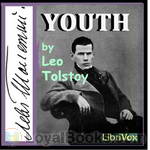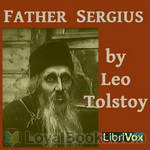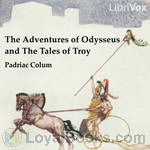|
Books Should Be Free Loyal Books Free Public Domain Audiobooks & eBook Downloads |
|
|
Books Should Be Free Loyal Books Free Public Domain Audiobooks & eBook Downloads |
|
Books on Languages |
|---|
|
Book type:
Sort by:
View by:
|
By: Leo Tolstoy | |
|---|---|
 Youth
Youth
Youth is the third in Tolstoy's trilogy of three autobiographical novels, including Childhood and Boyhood, published in a literary journal during the 1850s. (Introduction by Bill Boerst) | |
 Father Sergius
Father Sergius
Prince Stepan Kasatsky experiences a disappointment with his fiancé and decides to become a monk! There is a story line, but beneath it, Father Sergius struggles to find peace and, if not happiness, then at least contentment. But he is always disillusioned and ultimately unsatisfied. Only in the end does he find his way by letting go of what he struggled to attain all his life, i.e. to be better than everyone else in whatever he did, and settle for the mundane. | |
 The Awakening (The Resurrection)
The Awakening (The Resurrection)
| |
 The Forged Coupon
The Forged Coupon
| |
 The Power of Darkness
The Power of Darkness
| |
 On the Significance of Science and Art
On the Significance of Science and Art
| |
 The Light Shines in Darkness
The Light Shines in Darkness
| |
 Fruits of Culture
Fruits of Culture
| |
 The Cause of it All
The Cause of it All
| |
 The Live Corpse
The Live Corpse
| |
 Plays Complete Edition, Including the Posthumous Plays
Plays Complete Edition, Including the Posthumous Plays
| |
 The First Distiller
The First Distiller
| |
By: Leonid Nikolayevich Andreyev (1871-1919) | |
|---|---|
 Man Who Found the Truth
Man Who Found the Truth
An old man, accused of having murdered his family as a young man, spends a lifetime in prison. With brilliant psychological insight so characteristic of Leonid Andreyev's work, we follow this man telling his story about his obsession with truth and lies and his religion of the iron grate, tinged with madness, and not necessarily reliable.. | |
By: Lida Myrtle Williams (1877-) | |
|---|---|
 How to Teach Phonics
How to Teach Phonics
| |
By: Lucian of Samosata (120—180) | |
|---|---|
 Trips to the Moon
Trips to the Moon
The endeavour of small Greek historians to add interest to their work by magnifying the exploits of their countrymen, and piling wonder upon wonder, Lucian first condemned in his Instructions for Writing History, and then caricatured in his True History, wherein is contained the account of a trip to the moon, a piece which must have been enjoyed by Rabelais, which suggested to Cyrano de Bergerac his Voyages to the Moon and to the Sun, and insensibly contributed, perhaps, directly or through Bergerac, to the conception of Gulliver’s Travels. The Icaro-Menippus Dialogue describes another trip to the moon, though its satire is more especially directed against the philosophers. | |
By: Lucius Apuleius (125?-180) | |
|---|---|
 The Golden Asse
The Golden Asse
| |
 The Apologia and Florida of Apuleius of Madaura
The Apologia and Florida of Apuleius of Madaura
| |
By: Maciej Kazimierz Sarbiewski (1595-1640) | |
|---|---|
 The Odes of Casimire, Translated by G. Hils
The Odes of Casimire, Translated by G. Hils
| |
By: Maksim Gorky (1868-1936) | |
|---|---|
 Mother
Mother
| |
 Creatures That Once Were Men
Creatures That Once Were Men
| |
 Through Russia
Through Russia
| |
 The Man Who Was Afraid
The Man Who Was Afraid
| |
 Creatures That Once Were Men
Creatures That Once Were Men
| |
By: Marcus Vitruvius Pollio (75 BC - c. 15 BC) | |
|---|---|
 Ten Books on Architecture
Ten Books on Architecture
On Architecture is a treatise on architecture written by the Roman architect Vitruvius and dedicated to his patron, the emperor Caesar Augustus as a guide for building projects. The work is one of the most important sources of modern knowledge of Roman building methods as well as the planning and design of structures, both large (aqueducts, buildings, baths, harbours) and small (machines, measuring devices, instruments). He is also the prime source of the famous story of Archimedes and his bath-time discovery. | |
By: Marmaduke Park | |
|---|---|
 Aesop, in Rhyme Old Friends in a New Dress
Aesop, in Rhyme Old Friends in a New Dress
| |
By: Martha Dickinson Bianchi (1866-1943) | |
|---|---|
 Russian Lyrics
Russian Lyrics
| |
By: Martí Joan de Galba (-1490) | |
|---|---|
 The White Knight: Tirant Lo Blanc
The White Knight: Tirant Lo Blanc
| |
By: Mary Owens Crowther | |
|---|---|
 How to Write Letters (Formerly The Book of Letters) A Complete Guide to Correct Business and Personal Correspondence
How to Write Letters (Formerly The Book of Letters) A Complete Guide to Correct Business and Personal Correspondence
| |
By: Matthew Arnold (1822-1888) | |
|---|---|
 Celtic Literature
Celtic Literature
| |
By: Michael Clarke (1844?-1916) | |
|---|---|
 Story of Aeneas
Story of Aeneas
| |
By: Mikhail Yurevich Lermontov (1814-1841) | |
|---|---|
 Hero of Our Time
Hero of Our Time
A Hero of Our Time is indeed a portrait, but not of one man. It is a portrait built up of all our generation's vices in full bloom. You will again tell me that a human being cannot be so wicked, and I will reply that if you can believe in the existence of all the villains of tragedy and romance, why wouldn't believe that there was a Pechorin? If you could admire far more terrifying and repulsive types, why aren't you more merciful to this character, even if it is fictitious? Isn't it because there's more truth in it than you might wish? | |
By: Morris Rosenfeld (1862-1923) | |
|---|---|
 Songs of Labor and Other Poems
Songs of Labor and Other Poems
| |
By: Mr. (John) Oldmixon (1673-1742) | |
|---|---|
 Reflections on Dr. Swift's Letter to Harley (1712) and The British Academy (1712)
Reflections on Dr. Swift's Letter to Harley (1712) and The British Academy (1712)
| |
By: N. A. (Napoléon-Antoine) Belcourt (1860-1932) | |
|---|---|
 Bilingualism Address delivered before the Quebec Canadian Club, at Quebec, Tuesday, March 28th, 1916
Bilingualism Address delivered before the Quebec Canadian Club, at Quebec, Tuesday, March 28th, 1916
| |
By: Nahum Slouschz (1872-1966) | |
|---|---|
 The Renascence of Hebrew Literature (1743-1885)
The Renascence of Hebrew Literature (1743-1885)
| |
By: Nathaniel Bright Emerson (1839-1915) | |
|---|---|
 Unwritten Literature of Hawaii The Sacred Songs of the Hula
Unwritten Literature of Hawaii The Sacred Songs of the Hula
| |
By: Nikolai Vasilievich Gogol | |
|---|---|
 Dead Souls
Dead Souls
Dead Souls by Nikolai Gogol, Russian writer, was first published in 1842, and is one of the most prominent works of 19th-century Russian literature. Gogol himself saw it as an “epic poem in prose”, and within the book as a “novel in verse”. Despite supposedly completing the trilogy’s second part, Gogol destroyed it shortly before his death. Although the novel ends in mid-sentence (like Sterne’s Sentimental Journey), it is usually regarded as complete in the extant form. In Russia before the emancipation of the serfs in 1861, landowners were entitled to own serfs to farm their land... | |
By: of Phlossa near Smyrna Bion | |
|---|---|
 Theocritus Bion and Moschus Rendered into English Prose
Theocritus Bion and Moschus Rendered into English Prose
| |
By: of Samosata Lucian (120-180) | |
|---|---|
 Works of Lucian of Samosata — Volume 01
Works of Lucian of Samosata — Volume 01
| |
By: Okakura Kakuzo (1863-1913) | |
|---|---|
 The Book of Tea
The Book of Tea
The Book of Tea was written by Okakura Kakuzo in the early 20th century. It was first published in 1906, and has since been republished many times. – In the book, Kakuzo introduces the term Teaism and how Tea has affected nearly every aspect of Japanese culture, thought, and life. The book is noted to be accessibile to Western audiences because though Kakuzo was born and raised Japanese, he was trained from a young age to speak English; and would speak it all his life, becoming proficient at communicating his thoughts in the Western Mind... | |
By: Oliver Optic (1822-1897) | |
|---|---|
 A Spelling-Book for Advanced Classes
A Spelling-Book for Advanced Classes
| |
By: Ontario. Ministry of Education | |
|---|---|
 Ontario Teachers' Manuals: Literature
Ontario Teachers' Manuals: Literature
| |
By: Otis Ashmore (1853-) | |
|---|---|
 A Manual of Pronunciation For Practical Use in Schools and Families
A Manual of Pronunciation For Practical Use in Schools and Families
| |
By: P. (Patrick) Power (1862-1951) | |
|---|---|
 The Life of St. Declan of Ardmore
The Life of St. Declan of Ardmore
| |
By: Padraic Colum (1881-1972) | |
|---|---|
 The Adventures of Odysseus and the Tale of Troy
The Adventures of Odysseus and the Tale of Troy
Also known as “The Children’s Homer,” this is Irish writer Padraic Colum’s retelling of the events of Homer’s Iliad and Odyssey for young people. Colum’s rich, evocative prose narrates the travails of Odysseus, King of Ithaca: his experiences fighting the Trojan War, and his ten years’ journey home to his faithful wife Penelope and his son Telemachus. | |